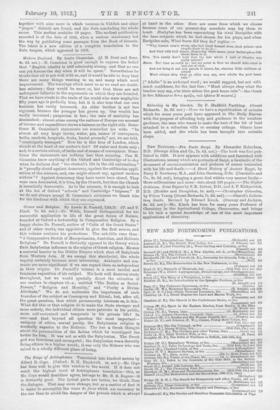Greece and Babylon. By Lewis B. Parnell, Litt.D. (T. and
T. Clark. 'Is. 6d. net.)—Dr. Wilde, himself distinguished for his successful application to life of the great forces of Nature, founded at Oxford a lectureship in Comparative Religion. By a happy choice Dr. Parnell, author of "Cults of the Greek States" and of other works, was appointed to give the first course, and this volume contains his prelections. The sub-title runs thus "A Comparative Sketch of Mesopotamian, Anatolian, and Hellenic Religions." Dr. Parnell is distinctly opposed to the theory which finds Babylonian influence in the origins of Greek religion. He sees a material barrier in the Hittite Empire which shut off Babylonia from Western Asia. If we occupy this standpoint, the whole inquiry certainly becomes more interesting. Analogies and con- trasts are more significant if we can regard them as independent in their origins. Dr. Parnell's volume is a most careful and luminous exposition of his subject. His book well deserves study throughout, but we would specially direct the attention of our readers to chapters vii.-x., entitled "The Deities as Social- Powers," "Religion and Morality," and "Purity a Divine Attribute." We do not underrate the importance of such branches of the subject as Cosmogony and Ritual; but, after all, the great question, that which permanently interests us, is this; 'What did this or that religion do to make the State stronger and more orderly, the individual citizen more patriotic in his public, more self-restrained and temperate in his private life ? In one—and that beyond all question the most important— category of ethics, sexual purity, the Babylonian religion is markedly superior to the Hellenic. The less a Greek thought about the personalities of the deities which ho worshipped the better for him. It was not so with the Babylonian. The Greek god was licentious and revengeful ; the Babylonian was a decently living citizen in a higher world ; it was only the Hebrew who was raised to a wholly different plane of being.










































 Previous page
Previous page